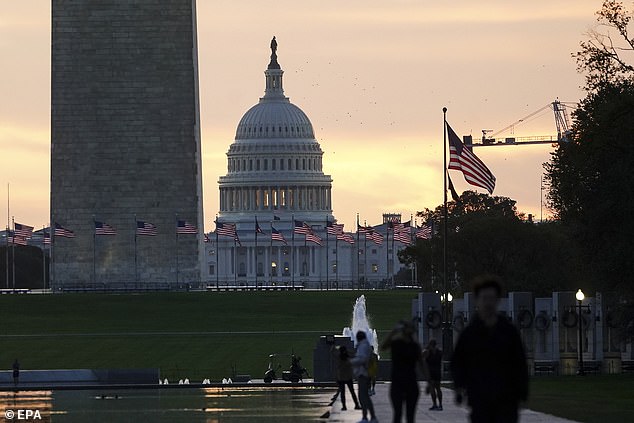There is nothing unusual about the latest US government shutdown.
Debt limits provide a regular cliff edge for funding of the American government’s $7trillion of annual spending.
It is a chance for politically isolated Democrats to play hardball with a Republican majority and recidivist White House.
There have been 15 such events since 1981 and occasionally they have led to credit agencies downgrading US debt by a notch.
Clearly a shutdown has serious consequences. It effectively halts $1.7trillion of current spending by government departments.
There is anxiety on Wall Street that it will prevent the release of September’s employment data, disrupting the obsession over the Federal Reserve’s next move on interest rates.

All stop: The US Capitol in Washington, DC. The US government has shutdown after the US Senate failed to pass a funding bill, effectively halting $1.7tn of current spending
The shutdown will be uncomfortable. Some 750,000 federal workers face furlough, and troops could see pay suspended.
It is not, however, expected to have a dramatic impact on the economy. Oxford Economics estimates it will shave 0.1 to 0.2 percentage points off ebullient growth.
Should it last for three months (that has never happened before) there could be lasting damage with real growth scythed by between 1.2 and 2.4 points, pushing America into slump territory.
My fear is that this is just another thing at a time when financial markets are frothy and the possibility of a crash is becoming very real.
Recent deals give cause for despair. Nvidia’s $100billion funding for OpenAI poses all kinds of questions about over-reach, payback, and delivery.
This week’s £40billion bid led by Donald Trump’s son-in-law Jared Kushner and others for gaming giant Electronic
Arts is a top of the market transaction. It provides a reminder of the disastrous £260billion AOL-Time Warner merger that heralded the dot.com meltdown 25 years ago.
The main thing this deal has going for it is the presence of the £700billion Saudi Arabian Public Investment Fund as a cornerstone equity investor.
But even rich sovereign wealth funds could capsize if the oil price took a serious tumble.
Closer to home one should be celebrating the FTSE 100’s recent performance, given its past underwhelming showing.
But there is a disconnect between share values and Britain’s underlying performance.
The latest forward-looking manufacturing index from S&P shows industry in Britain at its grimmest mood for five months and well into recession territory.
Cyber problems at Jaguar Land Rover will be casting a pall over supply chains.
Warning signs are everywhere. The International Monetary Fund this week sent out a note headed ‘uncertainty about uncertainty’.
It cautions that high levels of uncertainty ‘can freeze consumption, tank markets and help spark recession’.
After conference speeches by the Prime Minister and Chancellor, the yield on UK two-year gilts leapt to 4.039 per cent.
That hammers prospects of cheaper fixed-rate mortgages. Meanwhile, safe-haven bullion’s historic surge shows no sign of abating.
Investment adviser Saxo is telling clients to build resilience through ‘quality’ equities and bigger holdings of bonds and gold. One hates to be Cassandra, but the hurricane is on its way.
Cyber champs
UEFA and Eurovision may be under pressure by Palestinian activists to ban Israel. But not everyone feels the same.
The latest data shows that Israeli tech raised nearly £9billion of new investment in the first nine months of this year. Even more impressive is that Silicon Valley has not given up on the ‘start-up nation’.
Mergers and acquisitions in that period hit £53billion, driven by Alphabet’s £25billion buyout of cyber security firm Wiz and Palo Alto Networks’ £20billion acquisition of CyberArk.
Western commerce, notably Jaguar Land Rover and M&S, and governments are too often targeted by cyber criminals. Israel’s security technology offers protection for personal, commercial, and official data.
Chasing clients
Intriguingly JP Morgan took UK fintech adviser brand Nutmeg in-house this week under its Chase umbrella, and will soon launch its own retail investor platform.
The message for AJ Bell, Hargreaves Lansdown et al: we are coming for you.
DIY INVESTING PLATFORMS

AJ Bell

AJ Bell
Easy investing and ready-made portfolios

Hargreaves Lansdown

Hargreaves Lansdown
Free fund dealing and investment ideas

interactive investor

interactive investor
Flat-fee investing from £4.99 per month

InvestEngine

InvestEngine
Account and trading fee-free ETF investing
Trading 212
Trading 212
Free share dealing and no account fee
Affiliate links: If you take out a product This is Money may earn a commission. These deals are chosen by our editorial team, as we think they are worth highlighting. This does not affect our editorial independence.
This article was originally published by a www.dailymail.co.uk . Read the Original article here. .

